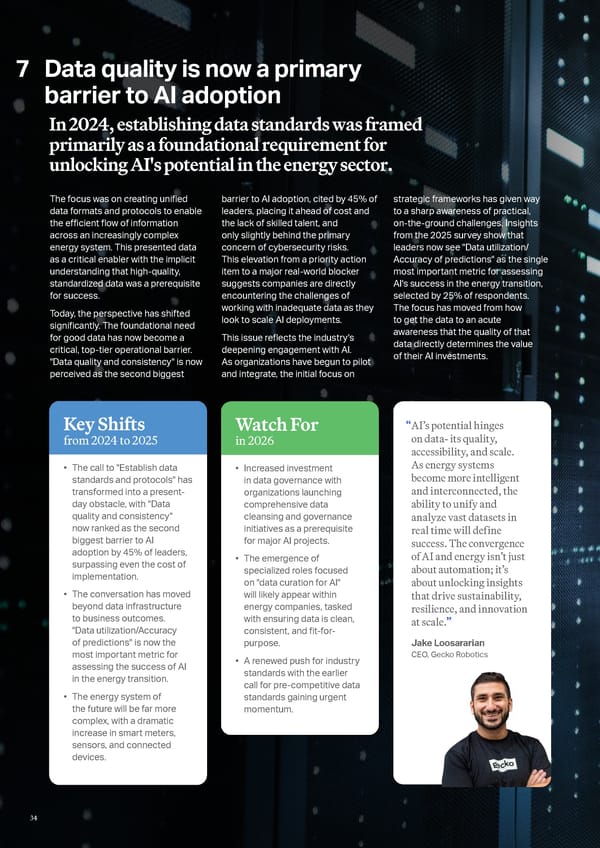7 Data quality is now a primary barrier to AI adoption In 2024, establishing data standards was framed primarily as a foundational requirement for unlocking AI's potential in the energy sector. The focus was on creating unified data formats and protocols to enable the efficient flow of information across an increasingly complex energy system. This presented data as a critical enabler with the implicit understanding that high-quality, standardized data was a prerequisite for success. Today, the perspective has shifted significantly. The foundational need for good data has now become a critical, top-tier operational barrier. "Data quality and consistency" is now perceived as the second biggest barrier to AI adoption, cited by 45% of leaders, placing it ahead of cost and the lack of skilled talent, and only slightly behind the primary concern of cybersecurity risks. This elevation from a priority action item to a major real-world blocker suggests companies are directly encountering the challenges of working with inadequate data as they look to scale AI deployments. This issue reflects the industry's deepening engagement with AI. As organizations have begun to pilot and integrate, the initial focus on strategic frameworks has given way to a sharp awareness of practical, on-the-ground challenges. Insights from the 2025 survey show that leaders now see "Data utilization/ Accuracy of predictions" as the single most important metric for assessing AI's success in the energy transition, selected by 25% of respondents. The focus has moved from how to get the data to an acute awareness that the quality of that data directly determines the value of their AI investments. AIs potential hinges on data- its quality, accessibility, and scale. As energy systems become more intelligent and interconnected, the ability to unify and analyze vast datasets in real time will define success. The convergence of AI and energy isnt just about automation; its about unlocking insights that drive sustainability, resilience, and innovation at scale. Jake Loosararian CEO, Gecko Robotics Key Shifts from 2024 to 2025 The call to "Establish data standards and protocols" has transformed into a present- day obstacle, with "Data quality and consistency" now ranked as the second biggest barrier to AI adoption by 45% of leaders, surpassing even the cost of implementation. The conversation has moved beyond data infrastructure to business outcomes. "Data utilization/Accuracy of predictions" is now the most important metric for assessing the success of AI in the energy transition. The energy system of the future will be far more complex, with a dramatic increase in smart meters, sensors, and connected devices. Watch For in 2026 Increased investment in data governance with organizations launching comprehensive data cleansing and governance initiatives as a prerequisite for major AI projects. The emergence of specialized roles focused on "data curation for AI" will likely appear within energy companies, tasked with ensuring data is clean, consistent, and fit-for- purpose. A renewed push for industry standards with the earlier call for pre-competitive data standards gaining urgent momentum. 32
 Powering Possible 2025: Unleashing AI for Energy and Energy for AI Page 31 Page 33
Powering Possible 2025: Unleashing AI for Energy and Energy for AI Page 31 Page 33